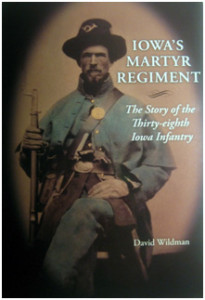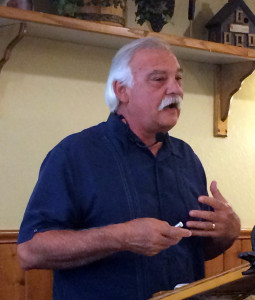Dave Wildman on “Iowa’s Martyr Regiment, The Story of the Thirty-eighth Iowa Infantry”
(From Drew @ Civil War Books and Authors)
Iowa’s Martyr Regiment: The Story of the Thirty-eighth Iowa Infantry, “is another fine unit history. But it is not a typical one. While many Hawkeye formations forged enviable battle records in the western and Trans-Mississippi theaters, the 38th always seemed to miss the action. Nevertheless, the roster of dead was incredibly high for such a comparatively meager combat history. While only two men were killed in action or mortally wounded, sickness sent over 300 of its soldiers to an early grave.”
In its battle with disease, the Thirty-eighth suffered a no less honored destiny than many regiments whose flags were covered with the names of battles. Combined with those discharged for disability and its combat casualties the Regiment suffered a fifty percent casualty rate without participating in any one of the great battles of the war. These dead are scattered along the Mississippi River from Dubuque, Iowa to New Orleans, and along the Gulf coast from Brownsville, Texas to Barrancas, Florida. Unlike other regiments, perhaps the Thirty-eighth Iowa’s battle flag should have been covered in black crepe, indicative of its fight with an unseen monster.
For those who survived the long dreary weeks when disease and death hung over their camps, they would find that this singular period of their service came to define the regiment’s place in Iowa’s Civil War history. In the Pioneer Days of Bremer County, Colonel W. V. Lucas saw it as “that unfortunate regiment.” Benjamin F. Gue, in the History of Iowa viewed the regiment’s history as “a sad and pathetic one,” and Lurton Ingersoll, in Iowa and the Rebellion believed, that what these men had passed through had earned them the honor to be called the “Martyr Regiment.”
 The letters, diaries, and memoirs of nearly fifty officers and men form the heart of Wildman’s research. In addition to the author’s careful chronicling of military movements, he extensively covers the unit’s camp life, political infighting, and the deleterious effects of the waves of sickness that frequently rocked the regiment. Even if the reader has little specific interest in the 38th, the author offers more than enough context to make his book worthwhile reading for students of the Vicksburg, Rio Grande, and Mobile campaigns, as well as counterinsurgency operations in southeast Missouri.
The letters, diaries, and memoirs of nearly fifty officers and men form the heart of Wildman’s research. In addition to the author’s careful chronicling of military movements, he extensively covers the unit’s camp life, political infighting, and the deleterious effects of the waves of sickness that frequently rocked the regiment. Even if the reader has little specific interest in the 38th, the author offers more than enough context to make his book worthwhile reading for students of the Vicksburg, Rio Grande, and Mobile campaigns, as well as counterinsurgency operations in southeast Missouri.
Dave Wildman is a member of the South Bay Round Table, and the American Civil War Association. He began his search for his great, great grandfather’s civil war story in 1976. By 2006 he had traveled through Iowa and the five counties where the Regiment was recruited, gathering local information. From Dubuque Iowa he followed the Regiment’s path down the Mississippi, stopping in Kentucky, Tennessee, and southeast Missouri. Then on to Vicksburg, Port Hudson, and New Orleans continuing his research. At last walking the battlefield at Blakely, Alabama, on Mobile Bay, where his ancestor charged across 500 yards of open ground in the last major battle of the Civil War. In 2010 he completed his research at the National Archives in Washington, D.C.

